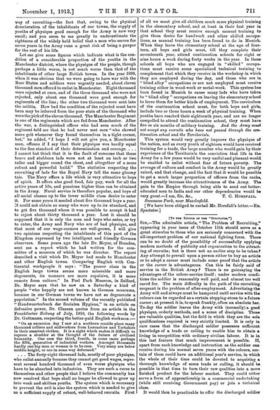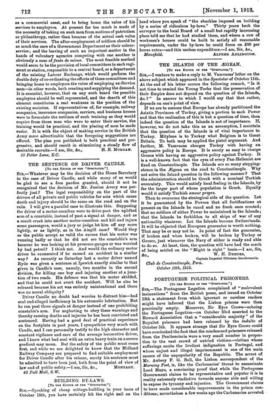[To THE EDITOR OF THE " SPECTATOR...3
Srn,—The admirable article, "The Problem of Recruiting," appearing in your issue of October 11th should serve as a great stimulus to those who are seriously concerned with the all-important problem of our national fighting force. There can be no doubt of the possibility of successfully applying modern methods of publicity and organization to the attract- ing of recruits ; but is there not an earlier step to be taken? Any attempt to prevail upon a person either to buy an article or to adopt a career must include some proof that the article or the career is advantageous. Can this be fairly said of service in the British Army ? There is no gainsaying the advantages of the colour-service itself : under modern condi- tions the soldier is reasonably well paid, and almost too well cared for. The main difficulty in the path of the recruiting sergeant is the problem of after-employment. Advertising the Army will and always must be hampered until service with the colours can be regarded as a certain stepping-stone to a future career; at present it is, to speak frankly, often an absolute bar. To-day the soldier leaves the Army with (normally) a good physique, orderly methods, and a sense of discipline. These are valuable qualities, but the field in which they are the sole qualifications required is very strictly limited. It is only in rare cases that the discharged soldier possesses sufficient knowledge of a trade or calling to enable him to obtain a living in competition with ordinary civilian labour. It is in this last feature that much improvement is possible. If, apart from such knowledge and instruction as the soldier can receive during his normal seven years with the colours, cer- tain of them could have an additional year's service, in which the whole of their time could be devoted to acquiring a thorough knowledge of some trade or calling, it should be possible in that time to turn their raw qualities into a more finished product for the labour market. They could either serve a form of apprenticeship in a commercial undertaking (while still receiving Government pay) or join a technical class.
It would then be practicable to offer the discharged soldier
as a commercial asset, and to bring home the value of his services to employers. At present far too much is made of the necessity of taking on such men from motives of patriotism or philanthropy, rather than because of the actual cash value of their services. The after-employment of soldiers should be as much the care of a Government Department as their colour- service ; and the leaving of such an important matter in the hands of voluntary agencies competing with one another is obviously a case of faute de miens. The most feasible method would seem to be the provision of local committees in each regi- ment or station, responsible to a central board, or a department of the existing Labour Exchange, which would perform the double duty of co-ordinating the efforts of these committees and bringing home to employers the value of employing ex-Service men—in other words, both creating and supplying the demand. It is essential, however, that on any such board the possible employers should be well represented, and the dearth of this element constitutes a real weakness in the position of the existing societies. If representatives of, for example, railway companies, insurance companies, carriers, and business houses were to formulate the outlines of such training as they would require from those men who were to enter their service, the training would be practical, and the placing of men be made easier. It is with the object of making service in the British Army more advertizable that the foregoing suggestions are offered. The plan you published is both practical and pro- gressive, and should result in stimulating a steady flow of desirable recruits.—I am, Sir, &c., H. E. Monaarr. 55 Fetter Lane, E.C.































































 Previous page
Previous page